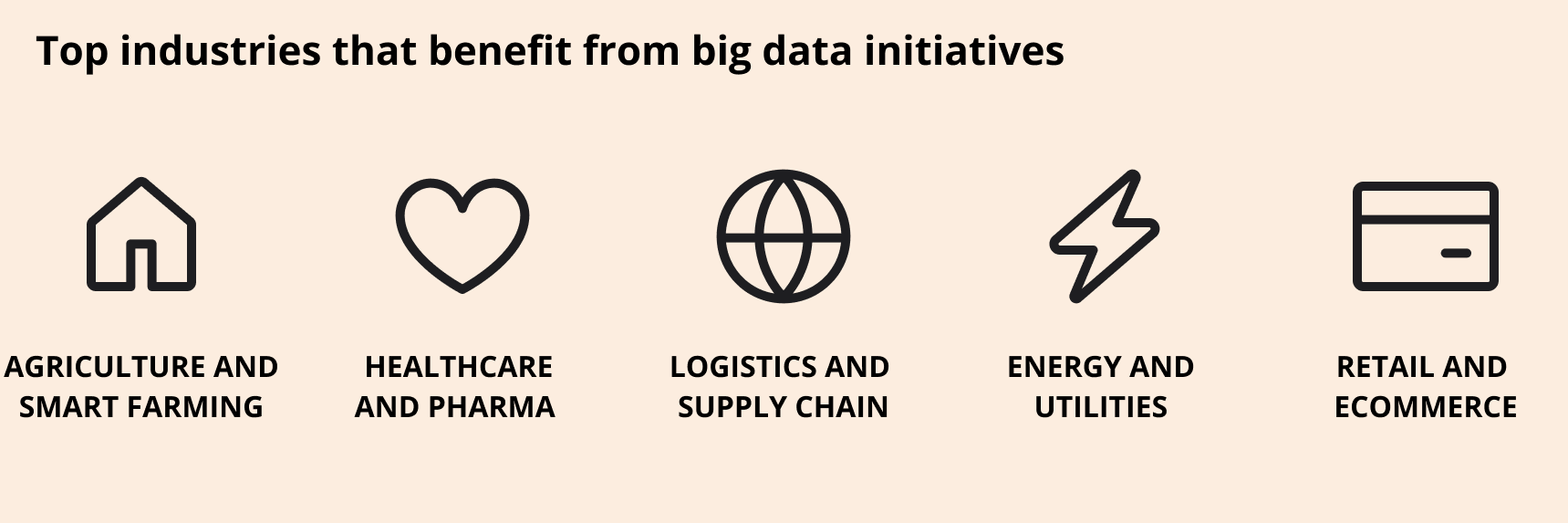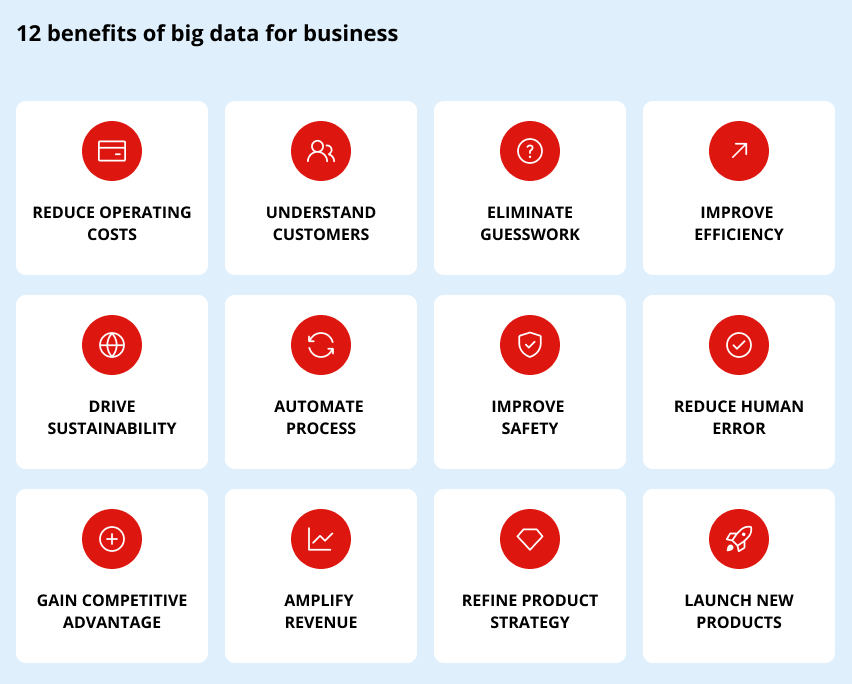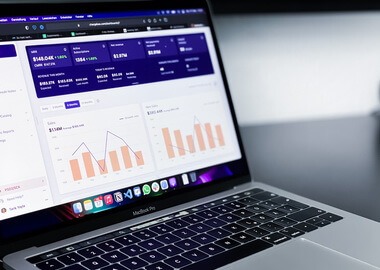12 Advantages of Big Data for Your Business
Everyone wants to get the advantages of big data. Investment in data initiatives goes through the roof with over 97% of organizations claiming to up their big data game (NewVantage, 2022). Yet, a lack of clear understanding of how to integrate insights into a business process remains one of the biggest challenges of big data.
In this post, we will go through 12 market-tested ideas to apply the power of big data to your business and make it more sustainable, resilient, and profitable. We will name some of the most popular use cases and answer a few questions on the way:
- What are the benefits of big data?
- What industries reap the most benefit from data?
- Which companies have already become insight-driven and how?
- How can you start using big data technology in your company?
No time to waste. Lezgo!
Access to insights is no longer a privilege of large well-off enterprises. All thanks to quickly proliferating cloud platforms and data management services. Today, every company from a one-man startup to a global conglomerate has a wide selection of tools to work with data.
For the first time, data-driven initiatives became affordable and accessible in every domain, from energy to retail. However, some industries reap more benefits of big data than others. Here are some of the most common initiatives across key industries and real-world examples:

Healthcare and pharma
- Remote patient monitoring and treatment management
- Precision medicine and personalized treatment
- Improved and accelerated clinical trials
- Predictive analytics for early diagnostics
- Infection control and disease prevention
- Smart hospitals and connected medical devices
Example: A global pharma company AstraZeneca used cloud-based data processing for analyzing petabytes of genomic data to power 40 drug discovery projects.
Agriculture
- Precision agriculture and smart irrigation
- Real-time monitoring: soil, crop, livestock, environment, etc.
- Smart greenhouse and automated hydroponic farming
- Predictive models and forecasts for planning and harvesting
- Remote farm management and agricultural robotics
- Big data analytics for sustainable agriculture
Example: A US-based UAV company AgEagle uses a combination of drones, remote sensing technology, and big data in agriculture for gathering geospatial data to monitor and analyze crop health and better manage fertilizer, pesticides, and water usage.
Logistics and supply chain
- Real-time monitoring of goods throughout the supply chain
- Dynamic route planning and optimization
- Fleet monitoring and management
- Smart and sustainable asset and resource management
- Automated sorting, inventory, and handling
Example: Logistics giant Maersk leverages the benefits of big data technologies and agile IoT development at scale to monitor every event throughout the supply chain, manage large fleets, predict and prevent potential issues and optimize operations at every step.
Energy
- Predictive and preventive equipment maintenance
- Real-time grid monitoring from power generation to consumption
- Power consumption analytics and dynamic price calculation
- Risk prediction and prevention
- Smart grid and reduced emissions
- Expert knowledge management and storage
Example: GE Renewable Energy offers a suite of sensor-based solutions for wind, hydro, hydrogen, and smart grid. It gives a 360-degree view of the plant’s operations based on real-time analytics and predictive algorithms.
Retail
- Personalized recommendations and customer experience
- Smart stores and omnichannel digital experiences
- Trend analytics and demand forecasting
- Insight-driven marketing and sales strategies
- Improved storage and inventory management
Example: Kroger generates insights throughout a chain of 2,800 groceries across the US to enhance customer service, dynamically allocate resources based on changing customer needs, and improve employee efficiency.
Let’s see how these and many other initiatives bring the benefits of big data to companies across all industries and domains.

1. Reduce operating costs and cut waste
Big data brings operational visibility and allows you to see what’s happening at your organization at any given time. Sensor data helps monitor and optimize the use of assets, resources, equipment, and spaces. Predictive and preventive analytics brings machine maintenance to the next level identifying problems before any symptoms show up. So you can cut costly downtime, better allocate resources and reduce waste.
This is one of the most valuable benefits of big data for businesses searching for ways to optimize cost and use of resources.
2. Improve efficiency
Once you gain visibility, you can easily spot inefficiencies in your process. For example, you can see low performance or reduced productivity on a certain site and, based on this information, figure out the cause of the problem.
Moreover, integrated data analytics can help you discover links between seemingly disconnected events. It will show you what to focus on to solve the problem. Like Kroger did when they found out that frequent disinfection caused damage to the PIN pad machines that, in turn, led to slower check-outs.
3. Drive sustainability
Big data is a driving force of sustainability, which makes it increasingly relevant to businesses along with other big data advantages. Many sustainability initiatives, from switching to renewables to optimizing delivery routes to conserving energy, are predominantly data-driven. Because you need the information to measure and analyze what you already have and build a strategy to reach your sustainability goals. For example, GPS agriculture data can help prevent water waste, and the excessive use of chemicals.
4. Improve safety and resilience
You can use data to evaluate risks, improve employee safety and enable resilience in your organization. Depending on your line of business, you can use wearables, IoT, or other data-driven technologies to monitor the environment, equipment, infrastructure, and even your employees’ physical state to ensure safe working conditions.
A great example is the Blackline Safety suite of connected tools that gather real-time data from the workers in the field to enable workforce visibility and safety.
5. Understand customer needs better
One of the biggest benefits of using big data in customer-centric domains such as retail or on-demand services is getting a panoramic view of customer journeys. Today, you can gather invaluable data from anything: sales and app stats, in-store smart equipment, reviews, social media, and more, and then combine this information to better understand your customer needs. Based on these insights, you create a personalized experience and recommend and sell relevant products and services. But most important of all, you nurture loyalty and boost customer lifetime value.
6. Eliminate guesswork
Not sure about the next step in your business? Big data will help you eliminate guesswork from your strategy and base your decision-making process on real-world insights. In fact, every blue-chip brand, from Levi’s to Samsung already leverages these big data benefits and monitors consumer trends and market changes to preserve its leading place in the niche.
7. Gain competitive advantage
What unites Maersk, Nexflix and Moderna? They all use data to gain a sustained competitive advantage in their markets. Whether it’s to revolutionize fleet management, provide unique recommendation services, or deliver a new vaccine in record terms, these companies put data at the heart of their winning strategies. And so can you.
Ready to up your business intelligence game?
Turn your data into your competitive advantage with a team of big data experts
SHOW BIG DATA SERVICES8. Automate process
Process automation is one of the most popular use cases for data collection and analytics. You can use data first to identify opportunities for automation and second to integrate data-driven automation into your operations. For instance, by using a blend of technologies – sensors, IoT, and machine learning – you can fully automate the lighting and temperature control in your storage facility and maintain an optimal environment without lifting a finger.
An outstanding example of these pros of big data is an enormous Alibaba warehouse powered by automated storage and retrieval systems, autonomous mobile robots, and smart inventory systems.
9. Reduce human error
Adopting big data initiatives has proven to reduce and, in some cases, completely eliminate human error. We already know about groundbreaking cancer screening applications that detect early-stage tumors with high accuracy. But the applications are endless in various industries — autonomous inventory in logistics, incident prevention monitoring in oil and gas, AI risk management in finances, and so on.
10. Amplify revenue
Financial benefits of big data in business work both ways. You can use data to reduce your costs, as we’ve mentioned before. Or (and) you can transform it into a source of revenue. This benefit also works on several levels.
For one, you can put the information you derive from your data into your sales cycle to better target your clients or customers, and upsell your product or services. Simple. Two, your data can suggest entirely new revenue streams. For example, the services that you don’t provide yet but, based on feedback, are much needed by your audience. And finally, data itself can become a commodity.
11. Refine your product strategy
No product strategy is set in stone. Business today has to be agile and “listen” to the market to stay afloat. This explains the growing role of business intelligence in today’s success stories, especially for the companies that run SaaS-model business.
So if you gather at least some information about the use of your product (customer feedback, session logs, MAU/DAU, etc.), you might as well reap the benefits of this data to tailor your product strategy — prioritize features, target a new audience, redesign interface, and so on.
12. Create entirely new products and services
This point stands out among other advantages of big data for businesses. Before we talked about how data can be instrumental for your business. But it can also become your business.
If you want a good example, think of Hewlett Packard Enterprise which was split from the PC producer HP as an independent company. HPE now provides cloud and data-first solutions and services and shows consistent growth year after year.

You can see that big data impact on business is immense. But how do you start the journey to a data-driven company? And how do you make sure that your investment won’t go down the drain without bringing tangible results?
Here are a few steps that can give you an idea of how to pave the way to leveraging big data.
Identify opportunities, challenges, and required competence
First things first, you need to understand what data you have/can access and how it relates to your business challenges and goals. Data inventory will help you review the data types and data quality you are dealing with.
Do you have silos owned by different departments? Do you have relevant competence in-house to work with your data assets? Do you already have some practices and tools for big data management? Answering these questions will help better understand the resources you will need to convert data into insights.
Manage and scale data
Before you enjoy the future benefits of big data, you have to work out a reliable, secure, and scalable strategy to manage and store your data. Mind that 90% of world data is unstructured. So there’s a high chance that a part or even all of your data will need to go through a complex pipeline (cleansing, sorting, grouping, enriching, etc.) to prepare for analysis and visualization. You can use abundant cloud business intelligence solutions and big data management services for these purposes.
Create a suite of tools to generate and deliver insights
This is the most satisfying stage because you can finally get your hands on valuable insights and integrate them into your decision-making process. But to do that, you first need to have a suite of data analytics and visualization tools that will generate and deliver insights. Depending on your goals, you can use advanced analytics, data science, and interactive dashboards to communicate insights and make the benefits of a big data solution you use available throughout your organization.
Want to discover the potential benefits of big data in a business setting and the unique requirements of your company? We can help. You can use our scalable resources and rich experience in big data projects to implement an initiative of any complexity. Here are only a few clients we helped to deliver successful data-driven solutions:
- Printique, a leading photo retailer serving millions of customers in the US, effortlessly copes with a 300% traffic increase every season without losing a single sale thanks to a custom system for big data performance monitoring. We designed and build the system to provide the production and management teams with 360-view of the entire process from order to completion and enable proactive and preventive management.
- Oxford Languages has been working with our dedicated team since 2015 to bring to life several complex lexical data initiatives, including dictionaries and data sets conversion, corpora platform development, and Oxford Dictionaries API. Since the beginning of our collaboration, Oxford Languages increased the speed of lexical data conversion 10x providing 99% accuracy at the output.
- The leading diagnostic company, Diaceutics partnered with Digiteum to design and develop an innovative cloud-based solution for precision medicine in less than a year. We scaled the client’s team and added senior software developers, data engineers, DevOps, and QA to help Diaceutics hit tight delivery goals while maintaining the original budget.
“Feedback from our customers and from the market has been very positive on DXRX and Digiteum was key to helping us achieve this success at reasonable costs and at a high level of quality.”Ryan Keeling, CEO, Diaceutics
Make your data work for you
Unleash the advantages of big data to make your business the most efficient and profitable in your niche
HIRE BIG DATA EXPERTSQuick round-up
- Today, a company of every size, in any industry can leverage big data with the help of modern cloud and data solutions.
- The majority of companies put their money on several advantages of big data: improved efficiency and reduced operating expenses, process automation, enhanced security and business resilience, and increased customer experience.
FAQ
- Reduced operating costs and cut waste
- Improved efficiency and process automation
- Increased sustainability
- Employee safety and business resilience
- Enhanced customer experience and customer lifetime value
- Sustained competitive advantage
- Reduced human error
- Revenue boost
- Data-driven product strategy
- New products and services






